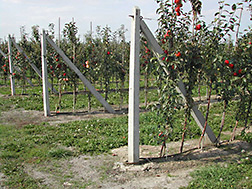This page has been archived and is being provided for reference purposes only. The page is no longer being updated, and therefore, links on the page may be invalid.
|
Read the magazine story to find out more. |
|
|
ARS Scientist Shares Cryopreservation Techniques Abroad
By Laura McGinnisNovember 14, 2005
Since 2001, Agricultural Research Service (ARS) plant physiologist Barbara Reed has been helping to preserve valuable plant genetic resources by flying tens of thousands of miles to teach scientists in Germany, Poland and Kazakhstan new methods for storing genetic resources for vegetatively propagated plants.
Plants that are vegetatively propagated, like many fruit and nut crop plants, reproduce by cuttings. Most cannot be grown from seeds or they will lose their characteristic fruit qualities. Seeds are generally hardier, cheaper and easier to maintain than live plants, so some genebanks can't afford to keep reserves for these clonal plants. Cryopreservation, the science of preserving part of a living plant at very low temperatures, is one solution to this problem.
Reed received a grant from the U.S. Department of Agriculture's Foreign Agricultural Service to teach cryopreservation protocols to international scientists. The foreign researchers visited Reed's lab in Corvallis, Ore., to observe how ARS preserves germplasm and to practice the new techniques. After two weeks, they returned to implement their new knowledge in their respective countries. Reed has visited all of the researchers in their homelands to ensure that the technology had been successfully transferred.
In Kazakhstan, Reed helped scientists remodel a laboratory and plan research projects. She has an additional grant from the ARS Former Soviet Union Scientific Cooperation Program with scientists in Kazakhstan. Although she has completed her work in Poland and Germany, she continues to work with the Kazakhstani scientists, helping them to preserve the region's diverse selection of apples and apricots at their genebank, located, fittingly, in the city of Almaty, whose name means "Father of Apples."
As Kazakhstan continues to develop, fields, farms and pastures are expanding into areas where these wild fruits flourish. Cryopreserved collections will help to conserve the important genetic diversity of these crops. The genes in these plants could be invaluable in crop breeding.
Read more about the research in the November 2005 issue of Agricultural Research magazine.
ARS is USDA's chief scientific research agency.


